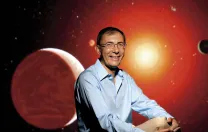In its first few years, the Origins of Life Initiative has forged new connections among faculty members in disparate departments and influenced similar programs at other universities (see “Life’s Beginnings”). It has led the investment in new tools and fostered cross-disciplinary research with postdoctoral fellowships. But launching such an endeavor has been challenging.
Sasselov has served as the effort’s ambassador. “We’re trying to answer a scientific question that may have few practical applications—it’s a very big question,” he says. “The reason why we’re bothering is because there’s such big, exciting science to be done.” But calling the science interdisciplinary is an understatement, he adds. There is simply no way to address it without broadening the typical scope of disciplines.
The initiative’s regular meetings have helped the nearly 30 associated faculty members explore connections within their research, and faculty are beginning to work collaboratively on papers. But the team has wanted more sustained funding for students and fellows to do research between labs, which would help make theoretical connections reality.
Despite a growing interest in interdisciplinary collaborations in science, the system of training, funding, and recognition still follows departmental distinctions. Sasselov’s larger goal is to ensure that when young chemists come to the program to do cross-disciplinary research with astronomers, they will go on to find positions that value that training, and fellow scholars able to evaluate grant proposals and papers that require peer review. “What we’re trying to do is create a worldwide community of scholars...who are truly representative of this new field,” he says. Beginning this May, the Simons Foundation has made an eight-year commitment to fund the Simons Collaboration on the Origins of Life, directed by Sasselov and Szostak, to connect investigators from several institutions in support of faculty research and postdoctoral fellowships in the area.
Sasselov’s hope is that the current resurgence of interest in life’s beginnings won’t get stymied again as it did in the middle of the last century, but will lead to a new way of understanding life in the universe.









